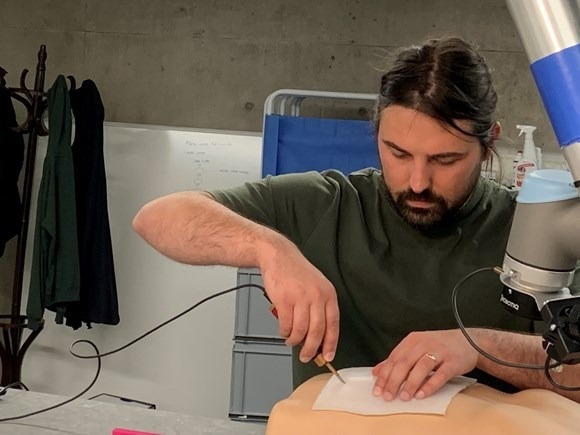Scalpels with built-in sensors could streamline training for surgeons and pave the way for procedures performed by robotic devices, a study suggests.
 Dr Arturas Straizys from the University of Edinburgh's School of Informatics demonstrates the smart scalpel in the lab. Image Credit: Rhona Crawford, University of Edinburgh
Dr Arturas Straizys from the University of Edinburgh's School of Informatics demonstrates the smart scalpel in the lab. Image Credit: Rhona Crawford, University of Edinburgh
Researchers who studied data captured by the scalpel during trials found its sensors could accurately track how much force users were applying during surgical procedures, and how they were controlling the device over time.
Sensor data analysis showed the technology could assess this key skill as effectively as traditional evaluation methods, which involve visual assessment by experienced practitioners.
Further development could see the technology – which is equipped with a newly developed force-sensing system – used to assess a wide range of surgical skills and aid the creation of robotic devices that can perform procedures safely and efficiently, the team says.
The low-cost device, developed at the University of Edinburgh, consists of a scalpel connected to a sensor-loaded circuit board fitted inside its handle. The research team designed a machine learning model that analyses data captured as force is applied by scalpel users.
While the level of force applied is known to be important in surgery, there have been few tools until now capable of measuring it in real-life settings. These types of measurements have also never been used in traditional assessments of surgical skill, the team says.
Researchers tested the new technology by tracking 12 medical students and two surgeons as they carried out a procedure known as an elliptical incision.
The procedure – which involves making two curved cuts to the skin – is used to remove moles and skin legions such as melanoma. Tests were performed on synthetic material made of gelatin and silicone that mimics the properties of human skin.
Data analysis of each participant’s skills was compared with naked eye assessments made by four surgical experts – two neuroscientists and two plastic surgeons.
Results broadly matched surgical experts’ assessment of each user’s ability, suggesting this type of technology could help simplify the process of assessing surgical skills.
Some discrepancies arose, partly because neuroscientists and plastic surgeons have differing instrument and tissue handling techniques, the team says.
The findings are published in the journal Communications Engineering. The research was supported by UK Research and Innovation (UKRI).
We are excited to develop this new system, which uses a combination of real-life sensing technology and machine learning methods to quantitatively assess surgical skill. This system will enable the development of new systems for skill assessment and training, and could one day lead to the creation of automated surgical devices that can assist surgical teams.”
Ram Ramamoorthy, Professor, University of Edinburgh’s School of Informatics